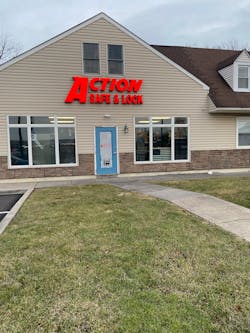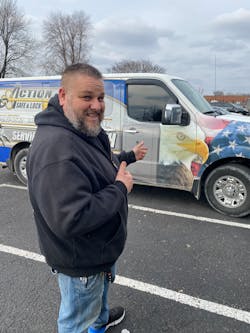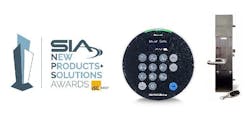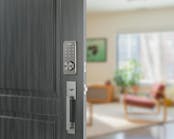Action Safe & Lock in Bristol, Pennsylvania, is an example of a family-owned lock shop that has been serving its customers for 60 years. Locksmith Ledger interviewed owners Ken and Bryan Chew to learn more about their strategy for promoting and maintaining a successful locksmith business.
Locksmith Ledger: Is it true that you guys actually grew up in a lock shop?
Ken Chew: Yes, my grandfather started in the 1960s. Generation number four is sitting over there (pointing to his son). I started in 1987 while in high school through the co-op program.
LL: When I use my GPS to find lock shops I’ve never been to before, I’ve noticed that some come up as “permanently closed” because of their status with Google? Is that how that works?
K.C.: Ours does that and we’re Google Verified. Some people call asking if we’re open because that’s what they see. My wife went through the whole Google verify process; she walked around the building, showed them our trucks and business.
LL: I’m interested in learning more about how locksmiths are promoting themselves. What happens if you Google your business?
K.C.: Sometimes people Google us and there’ll be another phone number right above our ad and they’ll call that number, thinking it’s us.
LL: Back in the Yellow Page era, did you guys have a big ad?
K.C.: Yes, I remember paying some astronomical price for a half-page ad. It was worthwhile since there was no internet yet and that was the only way. We used the colored ad that grabbed your attention. It was expensive but worthwhile.
LL: Ken, how long did it take before you had anything to do with acquiring new customers in addition to learning to be good at your trade?
K.C.: We’ve always had a good location with potential customers driving by. We always had the building nicely painted with all the important eye-grabbing information. We’ve always had a few nicely lettered trucks driving around, acting as roving billboards. Some of the hacks around here calling themselves locksmiths ride around in cars or a van with a rubber sticker on it.
LL: How have you succeeded at growing your business?
K.C.: First, you’ve got to stay up to date with current technology and you can’t be one dimensional. We’ve always done rekeys, automotive, safes, etc. We used to have guys come in after taking the Foley-Belsaw course asking us how to do various things. We’ve had a supposed locksmith come in asking to buy an exit trim because he had no key for it. I had to explain that since he’s a locksmith, he should make a key by picking or shimming open the cylinder. You won’t impress many customers that way.
LL: Do you remember when the Yellow Pages began to die?
K.C.: Yeah, not long after the internet was being used regularly. When you could ask your phone to find a locksmith near me and view a bunch of choices, that was the end of the phone book era. We weren’t too alarmed by the change since we’ve been around for years and word of mouth works in our favor. Lots of fellow locksmiths don’t do safe work so we wind up with more than enough of it in the area.
LL: Was it like that during the first couple of generations with your dad and grandfather? Did they tend to stay away from specializing and do all types of locksmithing?
K.C.: We did everything from installing floor safes, safe opening, automotive work for body shops. Air bags were a big deal when they were being used and we took a class on how to work around them. Good education isn’t easy to come across. Other than Lockmasters in Kentucky, where do you go to learn these days?
LL: What about associations and manufacturers’ classes?
K.C.: In my opinion, those classes tend to be more about the sales pitch than actual education and information you could use in the field. Even when programmers came out for automotive work, you’d be taught the basics but when it came to real-life scenarios, we were left to trial and error. These days it’s a little better; Advanced Diagnostics for example is helpful. In the old days you’d call a help line and wait a few hours for a call back. That’s not very helpful when you’re at the car trying to help a customer, especially after normal business hours.
LL: So, information is extremely important. Imagine just getting into locksmithing now?
K.C.: I feel sorry for anyone just starting a locksmith business now. Where do you start? Programmers are $5,000 to $10,000 with machines, software, etc. You have to stock car remotes and each year they change. One model could have three different remote choices. How many do you carry while new ones come out and older ones become obsolete? It wasn’t so bad when it was keys only; one or two blanks were good for many different models. Now every car has its own flip-out remote, different frequencies, etc. It’s not easy to find the information needed many times.
LL: Besides the Yellow Pages, what else has worked for you guys? I’m sure you couldn’t rely on just those ads.
K.C.: Actually, we were able to. It covered the area and we always kept two or three guys rolling all day. Nowadays we’re talking nonstop all day, every day. It’s great and a curse at the same time. You try to keep up with the bigger jobs while you’re taking care of the smaller ones coming in and it can get crazy.
LL: Your brother and your sons are working here. Do you consider yourself fortunate in that way?
K.C.: Yes, because at some point I’m going to want to step back a bit. I’m 50 and my brother is a little younger. Where do you find people with interest in locksmithing? The only way you find someone with any training is if they’re quitting another place. You can’t get guys from a tech school because they went for automotive or plumbing or HVAC so there aren’t many out there with interest or knowledge.
It could be quite overwhelming for a beginner; someone walks in with a car door lock. Next you get someone who needs a panic device trim. Someone else walks in with a motorcycle key so, of course, you have to learn the keyboard. The phone’s ringing off the hook and they have to be able to communicate clearly and answer questions. It could be overwhelming for a young person who’s just getting their feet wet. Unfortunately, society has pushed everyone to attend college and not many are going into the trades. We can’t find young people, so many shops wind up with retired guys coming back part time just to help out.
LL: What are you doing these days to promote your business?
K.C.: Again, I go back to the vans. Having your vehicles properly lettered while looking like a legit business goes a long way. A key and/or safe on there, your company name. People often mention something about us being family-owned and operated.
LL: Didn’t you guys build the shop we’re standing in by yourselves?
K.C.: Yes, other than the concrete, we pretty much built it from the ground up. Fortunately for us, my father and grandfather come from an era where you were a jack of all trades. You didn’t have the money to pay for everything to be done for you, so you learned how to yourself.
LL: How long ago did your grandfather start?
K.C.: That was back in 1963. When he bought it, it was Factory Grinding Service, offering small engine repair, knife and saw sharpening. Back in the 60s you left your key in your car and the front door was left open. Other than a lost key occasionally, there wasn’t the market for locks and security that there is today. Today, if you’re starting out in this business you’ve got to be able to stock what you need, especially if you’re doing after-hours work. During the day I could stop by IDN to pick something up for a job but after hours if I need something, I’m kind of screwed.
LL: Are you always available for emergency work?
K.C.: To an extent. Nowadays, it’s not too safe after hours in certain areas. The pandemic kind of screwed that up. Look at restaurants, for example. Places aren’t open all kinds of hours anymore; they’re closed half days, or closed on Mondays and Wednesdays. Your extra money used to come from after hours, weekends, running and gunning all the time. There’s just so much you can cover. I’d like to put 23 ½ hour service instead of 24/7 and then choose the half hour to say no.And that’s the issue with having your own business and being your own boss. You don’t clock out, it’s always in your head.
LL: Do you even think any more about how to attract more business?
K.C.: Not at all, as a matter of fact, we turn some away. Luckily, we service some very big companies who keep us busy for days at a time. If we stopped advertising completely, we’d lose some of the lockouts. Provide the service and you keep your customers. I’m not perfect; if we did something and have to go back, then we do that and the customer’s happy. Sometimes we all go on vacation together and a customer will call somebody else if it can’t wait. They’ll say, “I had to call someone else, and I’ll never call someone else again.”
LL: Do you ask customers how they came to choose you when they’re a new customer?
K.C.: Yes, lots of it is from word of mouth. Some are Googling and find us, and others will say they knew my father and/or grandfather. There’s nothing more important than trust in this business. You’re left alone to work on a bank vault or working in someone’s home; you need to be trusted.
LL: What do you see happening in our industry in the next 20 years or so? What should the fourth generation here be prepared for?
K.C.: Eventually the automotive business will go away. I think you’ll look at your smart phone and have your face recognized to start your car. There won’t be any mechanical credentials used. Maybe you’ll need someone to come out and plug a device into a port to open it. Some talk about electronic locks ruining our business but think about this; there’s about 600,000 people in this county. How many have electronic locks on their door now, 10% maybe? My kids will still be working on Schlage and Kwikset 20-30 years from now. I’m still working on that stuff that was installed that long ago.
LL: Bryan, I wound up speaking with Kenny primarily after you agreed to do this interview with me. I hope that’s okay with you.
Bryan Chew: He thinks everyone wants to talk to me because I’m the one joking around all the time. What do you talk to people about as you get to know them? You talk about kids, family, etc. There has to be some personality involved. When this is what you talk about, it means you’ve touched a part of their life. That big core order we just did; the first time that guy came in here I was messing with him from the start because that’s me. He complained about how dry and to the point they were at another shop. Next thing you know, he’s doing $100,000 a year with me because I messed with him, and we enjoy each other’s company.
LL: So, whether you like it or not, you’re a salesperson. It’s said that if people like you, they’ll go out of their way to do business with you and if they don’t like you, they’ll go out of their way to buy from someone else.
B.C.: When Tyler started here, I explained that if he’s going to sell safes for example, which we do a lot of, you’ve got to enjoy what you sell. You’ve got to understand the product and talk about it as if it’s something you want and are excited about. The mayor of our town was here looking at safes and he was dealing with my son. I came over to make sure it was going well, and he told me I should go do something else because Tyler was doing just fine. He looked him in the eye and answered every question. He went on to tell me if things didn’t work out here for some reason, he’d be glad to hire him to work for the township. We all went to install the safe in his home and he was really happy about that. People would much rather have a safe delivered and installed by people they like and trust; it’s more than just a business transaction.
Steve Kaufman has worked for distributors in the locksmith industry since 1993 and worked as a full-time locksmith from 1978 through the 1980s. Kaufman is the sales manager for IDN Hardware out of its Philadelphia location.
Steve Kaufman
Steve Kaufman has worked for distributors in the locksmith industry since 1993 and worked as a full-time locksmith from 1978 through the 1980s. Kaufman is the sales manager for IDN Hardware out of its Philadelphia location.








